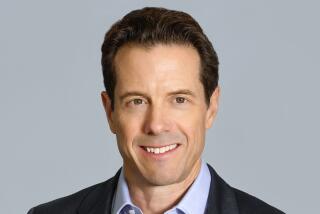Company Town: Ovitz Joins Disney : TELECOM : Ovitz’s Departure Is a Hard Lesson for Tele-TV Venture
- Share via
Last year, three Baby Bell telephone companies linked up with Michael Ovitz to learn the ways of Hollywood. And on Monday, they may have learned their biggest lesson yet--though it wasn’t exactly the one they had in mind.
It was Ovitz who persuaded Pacific Telesis, Nynex and Bell Atlantic that they needed to work together to develop the next generation of television. It was Ovitz who personally recruited their high-profile chief executive, former CBS President Howard Stringer.
And now it is Ovitz who has taught them that loyalty in Hollywood extends only as far as the next deal. As Stringer found out when his plane landed in Los Angeles Monday morning, Ovitz is not only leaving the agency and thus leaving the telephone companies in the lurch, he’s joining Walt Disney Co.--where a competing group of phone companies is working on a similar project.
The future of the CAA/phone company venture, called Tele-TV, is now up in the air.
“It’s a surprise and a disappointment,” said Pacific Telesis Chairman Philip Quigley. “Everything is under review. We always knew this kind of thing could happen, but we didn’t expect it in this time frame. It’s a crazy world you guys run down in that town.”
Tele-TV itself, which now employs 250 people and boasts a respected management team, including Stringer and veteran programming executive Sandy Grushow, will probably continue to operate much as it does now, at least for the moment. But the expensive consulting relationship with CAA may well be severed.
“Let’s face it,” said Quigley, “Michael was a big part of that organization.”
Ovitz has attended every Tele-TV board meeting except one, and just last May made a public appearance with top executives of the phone companies to promote the firm’s new logo and encourage Hollywood’s creative community to produce programming for the new distribution medium.
Now he may invest his zeal for new technology in the consortium of Baby Bells aligned with Disney--Ameritech, BellSouth and SBC Communications--and bolstered last week by the addition of GTE Corp. Indeed, Rick Wilson, GTE’s vice president for video programming, exulted Monday at the surprise announcement. “Ovitz’s move will greatly benefit us,” Wilson said.
Still, Stringer said other CAA executives such as Robert Kavner and Sandy Climan have been involved with Tele-TV on a daily basis, helping to develop a navigator to browse through the planned enormous selection of channels, and consulting on other issues.
“We’re not going to retaliate out of pique,” Stringer said. “We’re going to evaluate our relationship and do what’s in our best interest.”
Getting out of the CAA contract could save the fledgling venture a lot of money. One recent published report puts the consulting fee at a whopping $50 million, and much fun has been made of the Baby Bells for being star-struck.
And while Ovitz’s deal-making skills clearly came to bear on getting the company rolling, it’s not as obvious how a talent agency might help Tele-TV as it matures.
“It’s a very evolutionary process,” said Grushow. “What may be useful to us today as a strategic alliance may wear out a week from now. We’re going to continue to assess the situation to make sure we are as strong as we can possibly be at any turn.”
The rapid pace of change in technology may be equaled only by how quickly management changes occur in Hollywood.
“Ovitz was at the center of that deal, and now the premises under which it was made no longer pertain,” said Jonathan Seybold, a Malibu-based new-media analyst. “Welcome to Hollywood.”
More to Read
The biggest entertainment stories
Get our big stories about Hollywood, film, television, music, arts, culture and more right in your inbox as soon as they publish.
You may occasionally receive promotional content from the Los Angeles Times.










